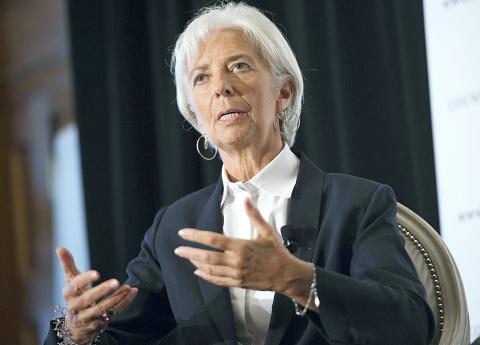The IMF on Wednesday voiced concern about the global economy, weakened by China’s slowdown and facing a potential “vicious cycle” from a looming US interest rate hike.
“On the economic front, there is ... reason to be concerned. The prospect of rising interest rates in the United States and China’s slowdown are contributing to uncertainty and higher market volatility,” IMF managing director Christine Lagarde said in a speech in Washington, according to the prepared text.
Lagarde also pointed to the “sharp deceleration” in the growth of global trade and the “rapid drop” in commodity prices, which is hammering the finances of commodity-exporting emerging market economies.

Photo: AFP
Many of the recent economic gains in Asia, Africa and Latin America “now seem in jeopardy,” said Lagarde, addressing the Council of the Americas ahead of next week’s IMF and World Bank annual meetings to be held in Lima, Peru.
The IMF head said that the fund’s World Economic Outlook report, to be published on Tuesday, would project weaker growth this year than last year and only a slight pick up next year.
In her speech, Lagarde emphasized the fund’s concern about the US Federal Reserve plan to raise its benchmark interest rate. The rate rise, still on the Fed’s radar for this year, could drive investors to pull funds from emerging countries into the US and further strengthen the strong US dollar, the currency on which the debt of many companies is based.
“Rising US interest rates and a stronger dollar could reveal currency mismatches, leading to corporate defaults — and a vicious cycle between corporates, banks, and sovereigns,” Lagarde said.
The IMF has repeatedly called for the Fed to wait until next year to increase its key rate for the first time in more than nine years.
Fed Chair Janet Yellen said the hike would likely come before year’s end.
Lagarde, in an interview with the CNBC television network, expressed support for Yellen’s stance that a rate hike would be data-dependent.
“We don’t see much movement on the inflation front, nor on the wages front,” Lagarde said. “If the data are not telling that story of inflation rising a bit by December, then why do it in December?

The US dollar was trading at NT$29.7 at 10am today on the Taipei Foreign Exchange, as the New Taiwan dollar gained NT$1.364 from the previous close last week. The NT dollar continued to rise today, after surging 3.07 percent on Friday. After opening at NT$30.91, the NT dollar gained more than NT$1 in just 15 minutes, briefly passing the NT$30 mark. Before the US Department of the Treasury's semi-annual currency report came out, expectations that the NT dollar would keep rising were already building. The NT dollar on Friday closed at NT$31.064, up by NT$0.953 — a 3.07 percent single-day gain. Today,

‘SHORT TERM’: The local currency would likely remain strong in the near term, driven by anticipated US trade pressure, capital inflows and expectations of a US Fed rate cut The US dollar is expected to fall below NT$30 in the near term, as traders anticipate increased pressure from Washington for Taiwan to allow the New Taiwan dollar to appreciate, Cathay United Bank (國泰世華銀行) chief economist Lin Chi-chao (林啟超) said. Following a sharp drop in the greenback against the NT dollar on Friday, Lin told the Central News Agency that the local currency is likely to remain strong in the short term, driven in part by market psychology surrounding anticipated US policy pressure. On Friday, the US dollar fell NT$0.953, or 3.07 percent, closing at NT$31.064 — its lowest level since Jan.

The New Taiwan dollar and Taiwanese stocks surged on signs that trade tensions between the world’s top two economies might start easing and as US tech earnings boosted the outlook of the nation’s semiconductor exports. The NT dollar strengthened as much as 3.8 percent versus the US dollar to 30.815, the biggest intraday gain since January 2011, closing at NT$31.064. The benchmark TAIEX jumped 2.73 percent to outperform the region’s equity gauges. Outlook for global trade improved after China said it is assessing possible trade talks with the US, providing a boost for the nation’s currency and shares. As the NT dollar

The Financial Supervisory Commission (FSC) yesterday met with some of the nation’s largest insurance companies as a skyrocketing New Taiwan dollar piles pressure on their hundreds of billions of dollars in US bond investments. The commission has asked some life insurance firms, among the biggest Asian holders of US debt, to discuss how the rapidly strengthening NT dollar has impacted their operations, people familiar with the matter said. The meeting took place as the NT dollar jumped as much as 5 percent yesterday, its biggest intraday gain in more than three decades. The local currency surged as exporters rushed to